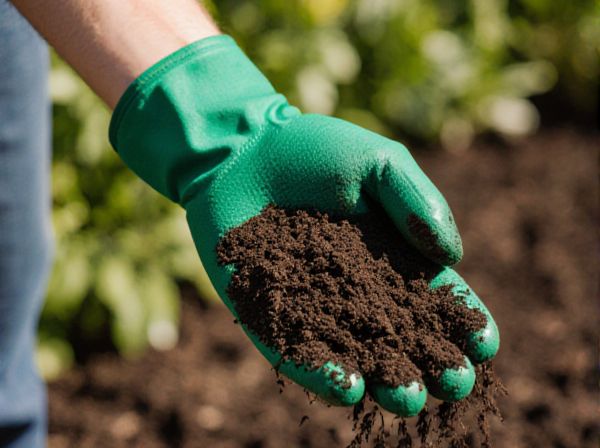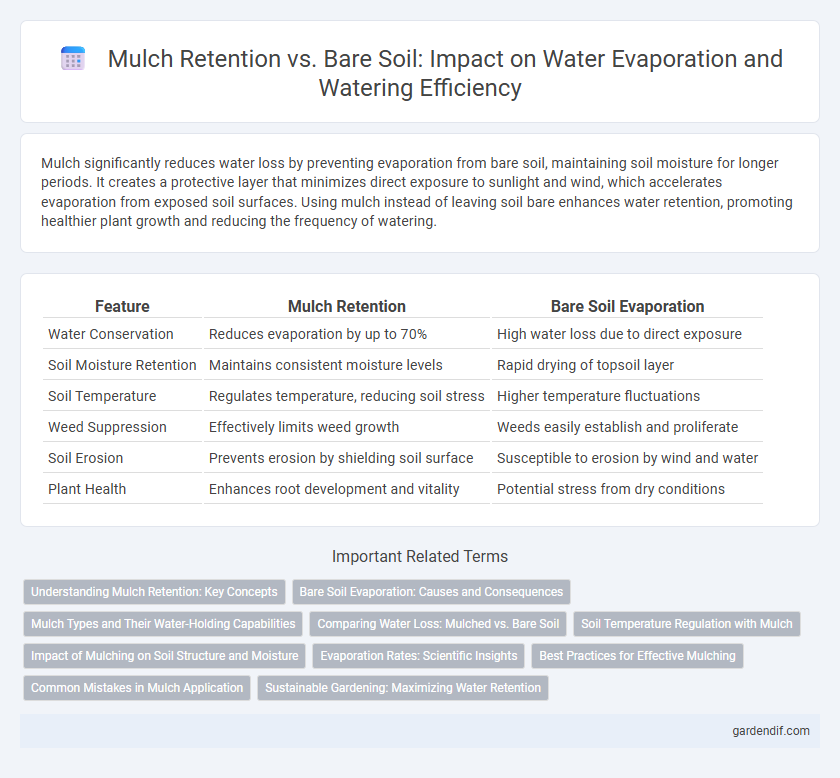
Mulch retention vs Bare soil evaporation Illustration
Mulch significantly reduces water loss by preventing evaporation from bare soil, maintaining soil moisture for longer periods. It creates a protective layer that minimizes direct exposure to sunlight and wind, which accelerates evaporation from exposed soil surfaces. Using mulch instead of leaving soil bare enhances water retention, promoting healthier plant growth and reducing the frequency of watering.
Table of Comparison
| Feature | Mulch Retention | Bare Soil Evaporation |
|---|---|---|
| Water Conservation | Reduces evaporation by up to 70% | High water loss due to direct exposure |
| Soil Moisture Retention | Maintains consistent moisture levels | Rapid drying of topsoil layer |
| Soil Temperature | Regulates temperature, reducing soil stress | Higher temperature fluctuations |
| Weed Suppression | Effectively limits weed growth | Weeds easily establish and proliferate |
| Soil Erosion | Prevents erosion by shielding soil surface | Susceptible to erosion by wind and water |
| Plant Health | Enhances root development and vitality | Potential stress from dry conditions |
Understanding Mulch Retention: Key Concepts
Mulch retention significantly reduces water loss by minimizing bare soil evaporation, improving moisture conservation in garden beds. Organic mulch materials like wood chips, straw, and compost create a protective barrier that regulates soil temperature and prevents direct sunlight from evaporating soil moisture. Understanding mulch retention involves recognizing its role in enhancing soil structure, reducing erosion, and promoting healthier plant root environments for sustained water efficiency.
Bare Soil Evaporation: Causes and Consequences
Bare soil evaporation occurs when exposed soil loses moisture directly to the atmosphere, driven by factors like high temperature, low humidity, and wind. This process leads to significant water loss, reducing soil moisture availability for plant roots and increasing irrigation needs. Persistent bare soil evaporation can cause soil degradation, reduce plant growth, and exacerbate drought stress in agricultural and garden settings.
Mulch Types and Their Water-Holding Capabilities
Organic mulches such as wood chips, straw, and shredded leaves excel at retaining moisture by reducing evaporation from the soil surface, helping maintain consistent hydration levels for plants. Inorganic mulches like gravel and rubber mats offer less water-holding capacity but still suppress evaporation by acting as physical barriers. Selecting mulch types based on their ability to conserve water can significantly improve irrigation efficiency and plant health in drought-prone environments.
Comparing Water Loss: Mulched vs. Bare Soil
Mulch retention significantly reduces water loss compared to bare soil by minimizing evaporation rates, often decreasing soil moisture loss by up to 30-50%. Mulched soils maintain consistent temperature and moisture levels, enhancing water conservation and promoting healthier plant growth. Bare soil, exposed to direct sunlight and wind, experiences faster evaporation, leading to increased irrigation needs and less efficient water use.
Soil Temperature Regulation with Mulch
Mulch significantly reduces bare soil evaporation by creating a protective layer that minimizes moisture loss and stabilizes soil temperature. This temperature regulation prevents extreme fluctuations, promoting optimal root growth and microbial activity essential for plant health. Using organic mulch materials like wood chips or straw enhances water retention while insulating soil against heat stress.
Impact of Mulching on Soil Structure and Moisture
Mulching significantly reduces bare soil evaporation by creating a protective layer that conserves soil moisture and stabilizes temperature fluctuations. It improves soil structure by enhancing organic matter content, which increases water infiltration and retention, promoting healthier root systems. Consequently, mulched soil exhibits better moisture conservation, reducing irrigation frequency and supporting sustainable water management in landscaping and agriculture.
Evaporation Rates: Scientific Insights
Mulch retention significantly reduces soil evaporation rates by creating a protective barrier that limits direct solar radiation and wind exposure, decreasing water loss by up to 70% compared to bare soil. Scientific studies demonstrate that mulch maintains higher soil moisture levels, thereby enhancing water use efficiency in irrigation practices. Evaporation rates from bare soil can increase dramatically under hot and dry conditions, making mulch an essential strategy for conserving soil moisture and improving plant health.
Best Practices for Effective Mulching
Applying a 2-4 inch layer of organic mulch significantly reduces soil evaporation compared to bare soil by retaining moisture and regulating temperature. Best practices for effective mulching include maintaining mulch thickness to prevent compaction, avoiding mulch contact with plant stems to reduce disease risk, and replenishing mulch regularly to sustain moisture retention. Utilizing materials such as wood chips, straw, or composted leaves enhances water conservation and promotes healthier soil ecosystems.
Common Mistakes in Mulch Application
Applying mulch too thinly can lead to insufficient moisture retention and increased soil evaporation, while layering mulch excessively thick blocks water infiltration, causing root rot. Common mistakes include using inappropriate mulch types that decompose quickly and failing to replenish mulch regularly, reducing its effectiveness in conserving soil moisture. Proper mulch application balances depth and material choice to minimize evaporation and promote healthy plant growth.
Sustainable Gardening: Maximizing Water Retention
Mulch significantly reduces bare soil evaporation by creating a protective barrier that retains moisture and regulates soil temperature in sustainable gardening practices. Organic mulches like wood chips, straw, or compost improve soil structure, promote microbial activity, and reduce water loss by up to 50%, enhancing overall water retention. Employing mulch not only conserves water resources but also supports healthier plant growth and mitigates the need for frequent irrigation.
Mulch retention vs Bare soil evaporation Infographic

 gardendif.com
gardendif.com